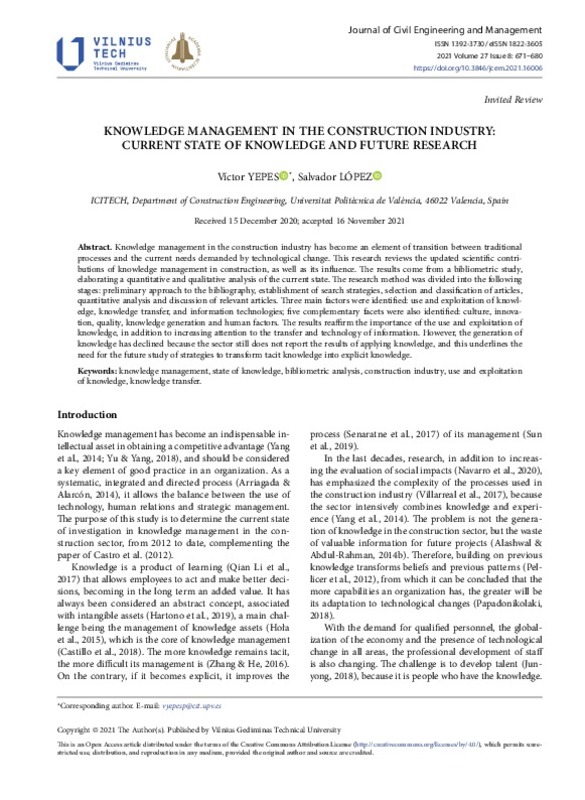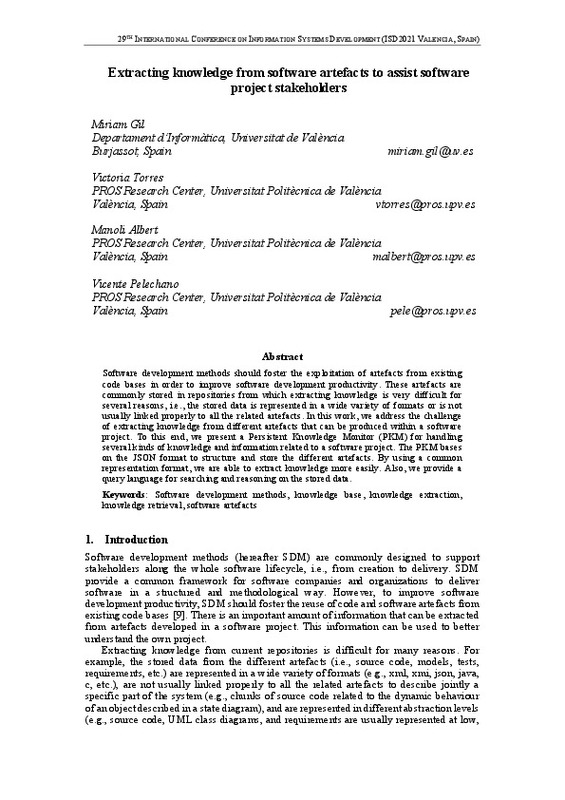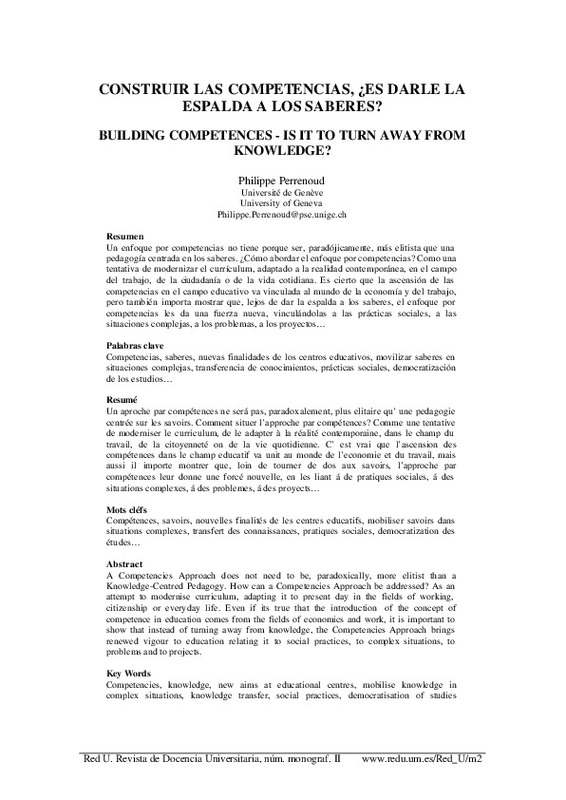JavaScript is disabled for your browser. Some features of this site may not work without it.
Buscar en RiuNet
Listar
Mi cuenta
Estadísticas
Ayuda RiuNet
Admin. UPV
Ontological supports of knowledge: knowledge creation and analytical knowledge
Mostrar el registro sencillo del ítem
Ficheros en el ítem
| dc.contributor.author | Akehurst, Gary
|
es_ES |
| dc.contributor.author | Rueda Armengot, Carlos
|
es_ES |
| dc.contributor.author | Vivas López, Salvador
|
es_ES |
| dc.contributor.author | Palacios Marqués, Daniel
|
es_ES |
| dc.date.accessioned | 2018-04-19T12:38:04Z | |
| dc.date.available | 2018-04-19T12:38:04Z | |
| dc.date.issued | 2011 | es_ES |
| dc.identifier.issn | 0025-1747 | es_ES |
| dc.identifier.uri | http://hdl.handle.net/10251/100711 | |
| dc.description.abstract | [EN] Purpose: The purpose of this paper is to examine, from the perspective of different theoretical approaches, the relationship that exists between different ontological supports of knowledge and knowledge itself (the way it is created and its characteristics). Design/methodology/approach: The paper proposes two different types of knowledge (knowledge of concrete situations and abstract knowledge) and two approaches (the constructivist view and the cognitive view) and provides a general classification of the different knowledge types. Second, it examines the underlying ontological support-knowledge creation, characteristics or types of knowledge relationship in different approaches. Finally, conclusions are drawn that show how the conception of ontological support conditions the way in which knowledge is conceived. Findings: The results of the paper consist of making explicit the ontological support-knowledge creation, characteristics or types of knowledge relationship in different approaches; and enabling understanding of the fact that the ideas one has about knowledge (how it is created or what its characteristics are) come from one's beliefs about the supports in, or in interaction with, which it is created. Research limitations/implications: The implications for the different approaches to knowledge theory are important. The study proposes a change with regard to how one considers the ontological supports of knowledge. The limitation of the paper lies in the fact that this proposal needs to be presented in a more extensive format, through a series of different papers and analyses. Originality/value: The originality of the paper stems from the fact that it focuses on the ontological supports of knowledge and highlights the idea that the conception of these supports leads to a particular way of conceiving knowledge. © Emerald Group Publishing Limited. | es_ES |
| dc.language | Inglés | es_ES |
| dc.publisher | EMERALD GROUP PUBLISHING LIMITED | es_ES |
| dc.relation.ispartof | Management Decision | es_ES |
| dc.rights | Reserva de todos los derechos | es_ES |
| dc.subject | Knowledge engineering | es_ES |
| dc.subject | Knowledge management | es_ES |
| dc.subject.classification | ORGANIZACION DE EMPRESAS | es_ES |
| dc.title | Ontological supports of knowledge: knowledge creation and analytical knowledge | es_ES |
| dc.type | Artículo | es_ES |
| dc.identifier.doi | 10.1108/00251741111109106 | es_ES |
| dc.rights.accessRights | Cerrado | es_ES |
| dc.contributor.affiliation | Universitat Politècnica de València. Departamento de Organización de Empresas - Departament d'Organització d'Empreses | es_ES |
| dc.description.accrualMethod | S | es_ES |
| dc.relation.publisherversion | https://doi.org/10.1108/00251741111109106 | es_ES |
| dc.description.upvformatpinicio | 183 | es_ES |
| dc.description.upvformatpfin | 194 | es_ES |
| dc.type.version | info:eu-repo/semantics/publishedVersion | es_ES |
| dc.description.volume | 49 | es_ES |
| dc.description.issue | 2 | es_ES |
| dc.relation.pasarela | S\40899 | es_ES |
| dc.description.references | Baggio, R., & Cooper, C. (2010). Knowledge transfer in a tourism destination: the effects of a network structure. The Service Industries Journal, 30(10), 1757-1771. doi:10.1080/02642060903580649 | es_ES |
| dc.description.references | Boisot, M., & Child, J. (1999). Organizations as Adaptive Systems in Complex Environments: The Case of China. Organization Science, 10(3), 237-252. doi:10.1287/orsc.10.3.237 | es_ES |
| dc.description.references | Child, J. (1997). Strategic Choice in the Analysis of Action, Structure, Organizations and Environment: Retrospect and Prospect. Organization Studies, 18(1), 43-76. doi:10.1177/017084069701800104 | es_ES |
| dc.description.references | Crossan, M.M., Lane, H.W. and White, R.E. (1999), “An organizational learning framework: from intuition to institution”, Academy of Management Review, Vol. 24 No. 3, pp. 522‐37. | es_ES |
| dc.description.references | Fama, E. F., & Jensen, M. C. (1983). Separation of Ownership and Control. The Journal of Law and Economics, 26(2), 301-325. doi:10.1086/467037 | es_ES |
| dc.description.references | Fama, E. F., & Jensen, M. C. (1983). Agency Problems and Residual Claims. The Journal of Law and Economics, 26(2), 327-349. doi:10.1086/467038 | es_ES |
| dc.description.references | Hambrick, D. C. (2007). Upper Echelons Theory: An Update. Academy of Management Review, 32(2), 334-343. doi:10.5465/amr.2007.24345254 | es_ES |
| dc.description.references | Hansen, M. T. (2002). Knowledge Networks: Explaining Effective Knowledge Sharing in Multiunit Companies. Organization Science, 13(3), 232-248. doi:10.1287/orsc.13.3.232.2771 | es_ES |
| dc.description.references | Hayek, F.A. (1945), “The use of knowledge in society”, American Economic Review, Vol. 35 No. 4, pp. 1‐18. | es_ES |
| dc.description.references | Hedlund, G. (2007). A model of knowledge management and the N-form corporation. Strategic Management Journal, 15(S2), 73-90. doi:10.1002/smj.4250151006 | es_ES |
| dc.description.references | McLeod, M. T., Vaughan, D. R., & Edwards, J. (2010). Knowledge networks in the tourism sector of the Bournemouth, Poole, and Christchurch conurbation: preliminary analysis. The Service Industries Journal, 30(10), 1651-1667. doi:10.1080/02642060903580664 | es_ES |
| dc.description.references | Martinez-Fernandez, C. (2009). Knowledge-intensive service activities in the success of the Australian mining industry. The Service Industries Journal, 30(1), 55-70. doi:10.1080/02642060802317820 | es_ES |
| dc.description.references | Mir, R., & Watson, A. (2000). Strategic management and the philosophy of science: the case for a constructivist methodology. Strategic Management Journal, 21(9), 941-953. doi:10.1002/1097-0266(200009)21:9<941::aid-smj141>3.0.co;2-d | es_ES |
| dc.description.references | Nonaka, I. (1991), “The knowledge‐creating company”, Harvard Business Review, November/December, pp. 96‐104. | es_ES |
| dc.description.references | Nonaka, I., & Konno, N. (1998). The Concept of «Ba»: Building a Foundation for Knowledge Creation. California Management Review, 40(3), 40-54. doi:10.2307/41165942 | es_ES |
| dc.description.references | Pechlaner, H., & Bachinger, M. (2010). Knowledge networks of innovative businesses: an explorative study in the region of Ingolstadt. The Service Industries Journal, 30(10), 1737-1756. doi:10.1080/02642060903580722 | es_ES |
| dc.description.references | Perrow, C. (1967). A Framework for the Comparative Analysis of Organizations. American Sociological Review, 32(2), 194. doi:10.2307/2091811 | es_ES |
| dc.description.references | Prahalad, C. K., & Bettis, R. A. (1986). The dominant logic: A new linkage between diversity and performance. Strategic Management Journal, 7(6), 485-501. doi:10.1002/smj.4250070602 | es_ES |
| dc.description.references | Prahalad, C.K. and Hamel, G. (1990), “The core competence of the corporation”, Harvard Business Review, Vol. 68 No. 3, pp. 79‐91. | es_ES |
| dc.description.references | Spender, J.-C. (1996). Making knowledge the basis of a dynamic theory of the firm. Strategic Management Journal, 17(S2), 45-62. doi:10.1002/smj.4250171106 | es_ES |
| dc.description.references | Spender, J. C. (2007). Data, meaning and practice: how the knowledge-based view can clarify technology’s relationship with organisations. International Journal of Technology Management, 38(1/2), 178. doi:10.1504/ijtm.2007.012435 | es_ES |
| dc.description.references | Spender, J.-C. (2008). Organizational Learning and Knowledge Management: Whence and Whither? Management Learning, 39(2), 159-176. doi:10.1177/1350507607087582 | es_ES |
| dc.description.references | Tolstoy, D. (2010). Knowledge combination in networks: evidence from the international venturing of four small biotech firms. International Entrepreneurship and Management Journal, 6(2), 183-202. doi:10.1007/s11365-010-0148-x | es_ES |
| dc.description.references | Tsoukas, H. (1996). The firm as a distributed knowledge system: A constructionist approach. Strategic Management Journal, 17(S2), 11-25. doi:10.1002/smj.4250171104 | es_ES |
| dc.description.references | Viljamaa, A., Kolehmainen, J., & Kuusisto, J. (2009). For and against? An exploration of inadvertent influences of policies on KIBS industries in the Finnish policy setting. The Service Industries Journal, 30(1), 71-84. doi:10.1080/02642060802238513 | es_ES |
| dc.description.references | Weick, K. E., & Roberts, K. H. (1993). Collective Mind in Organizations: Heedful Interrelating on Flight Decks. Administrative Science Quarterly, 38(3), 357. doi:10.2307/2393372 | es_ES |
| dc.description.references | Yin, X., & Zajac, E. J. (2004). The strategy/governance structure fit relationship: theory and evidence in franchising arrangements. Strategic Management Journal, 25(4), 365-383. doi:10.1002/smj.389 | es_ES |
| dc.description.references | Alchian, A.A. and Demsetz, H. (1972), “Production, information cost and economic organization”, American Economic Review, Vol. 62 No. 5, pp. 777‐95. | es_ES |
| dc.description.references | Nonaka, I. (1994). A Dynamic Theory of Organizational Knowledge Creation. Organization Science, 5(1), 14-37. doi:10.1287/orsc.5.1.14 | es_ES |






![[Cerrado]](/themes/UPV/images/candado.png)




